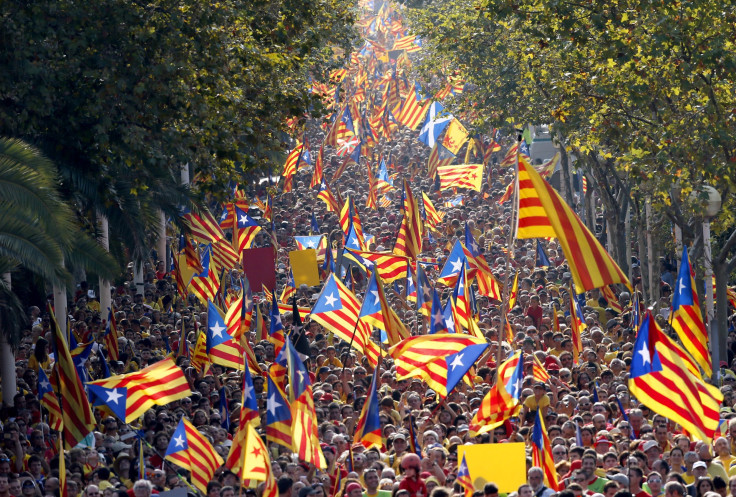Scotland Independence: Watch Catalonia Next To See How Yes From Scotland May Boost Other Independence Movements

If Scotland chooses to become independent on Thursday, the consequences would go far beyond the borders of the world’s newest nation. The Scots could help jump-start independence movements across the world, including some in the European Union, most of all Spain’s Catalonia, which votes in a non-binding independence referendum in November.
Then there’s Belgium, where the Flemish in the north have long sought their own state, and Italy, where 89 percent of voters in an unofficial, online referendum earlier this year said they wanted independence for Veneto, the northeastern region that includes the cities of Venice and Verona. And in Quebec, the biggest and second most populous province of Canada, independence lost by a tiny margin in a 1995 referendum.
“Whether Scotland goes Yes, or a very slight No, that’s going to energize all those other movements,” said Jenna Bednar, a professor at the University of Michigan who has written about federalism and secessionist movements.
Many separatists are already making their support for Scotland known, some of them traveling to Edinburgh to show their colors, like this supporter of Sardinia’s independence from Italy:
Sardinia. Here we are! #indyref #edinburgh pic.twitter.com/i2p9HHOKBA
- Chiara Albanese (@chiaraalbanese) September 18, 2014From the Kurds -- the world’s largest ethnic group without its own country -- to French-speaking Quebec to Tibet and Xinjiang in China, the list of ethnic or linguistic groups aspiring to their own nation is long. A peaceful separation of the Scots from the United Kingdom would send a message to separatists everywhere that they can go for it, too -- and maybe not to those we know already. “We will begin to to see movements we do not foresee now, energized by the Scottish vote,” Bednar said.
The Scottish vote would resonate the loudest in Flanders -- part of Belgium – and in Catalonia and Quebec, according to a report issued last week by Capital Economics.
“We are watching Catalonia and next Belgium,” Bednar said. The reason the two regions might push for statehood soon may be a combination of strong linguistic and ethnic identity and the security given by the European Union: “The existence of the EU makes it easier for these movements to make their case because they still have the security of a free trade areas and a common market,” Bednar said. “The existence of the EU makes it less expensive” to become independent, although membership in the European body would not be automatic for a new nation that secedes from a member state.
If Flanders and Catalonia seceded, “we suspect they would remain within the euro zone if they became independent countries,” wrote last week Andrew Kenningham, senior global economist at Capital Economics. Both regions are richer than the rest of their current nations, in terms of GDP per capita, and share a sense that they would do better unshackled from Belgium and Spain, as would the part of northern Italy known as Padania, which includes Veneto.
But for the Catalans and Flemish, there is more than the hope of being financially better off alone. Culture plays a big part. “This is their identity,” Bednar said. “They are looking at Scotland, which is not doing this for economic reasons, because the future of North Sea oil is so uncertain. Scotland isn’t doing it because they think they will be better off.” Both Catalonia and Flanders have their own distinct languages, used in schools, government, media and centuries-old literature.
Catalonia is planning to vote on Nov. 9 on a non-binding, two-part referendum asking if it should be a state and if so whether that state should be independent. The Madrid government has vowed that no referendum will be held. If the consultation takes place anyway -- polls suggest Catalans are split evenly -- the result would be just theoretical, unlike Scotland’s. But “votes like that, even if they do not establish a legal process, are going to make it very difficult for Spain not to respond,” Bednar said.
As for Quebec, the pro-independence Parti Québécois, which is currently out of power, is studying the Scottish referendum closely. Dozens of party members are currently in Scotland to study the strategy and tactics employed by the Scottish National Party.
"There are lots of similarities, first in that the Yes campaign has been positive, with the same message, that 'we're good enough and big enough, and we can do it,'" André Lecours, a political science professor at Canada’s University of Ottawa, told the Associated Press.
The French-speaking province came very close to its own state in 1995, when an independence referendum saw the No win with just 50.6 percent. But support for an independent Quebec these days is waning. In the 2014 provincial election the PQ won only 25 percent of the vote, its lowest total since 1970, and lost power.
The PQ and other pro-independence movements may feel emboldened even if Scottish independence comes out of the Thursday polls defeated. In the UK, “there may be more of a federal union on the table if No wins,” Bednar said, showing that a move for independence may end up netting at least more benefits, in order to keep the state united.
There is also, according to Capital Economics’ Kenningham, the possibility that a Yes victory may turn out to be bad for separatists. “If Scottish independence is followed by large-scale capital flight, relocation of businesses to England and a substantial ‘brain drain,’ its experience could undermine support for independence movements elsewhere,” he wrote.
© Copyright IBTimes 2024. All rights reserved.












